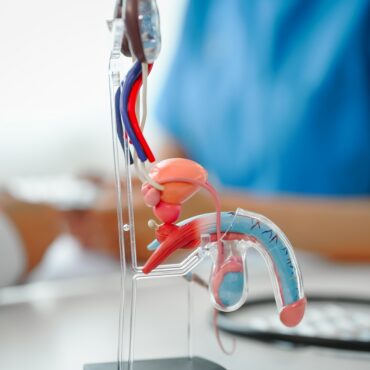-
 play_arrow
play_arrow
BayRadio Listen Live Broadcasting in Spain


Dr. Mirko Alavena, Neurologist at Quirónsalud Torrevieja, answers the most frequently asked questions about the types of dementia in the elderly and offers advice on how to live with it.
Types of dementia, what are they?
“Dementia is a loss of mental faculties due to damage to the brain, which results in an inability to live independently,” explains Dr. Alavena.
Damage to the brain can have different causes, although in the elderly the most common are neurodegenerative diseases and vascular injuries.
What are the symptoms of each type of dementia?
The specialist at Quirónsalud Torrevieja emphasizes the following types of dementia:
Alzheimer’s
The most common neurodegenerative disease that causes dementia in the elderly is Alzheimer’s, whose main symptom is memory loss.
Initially, short-term memory is affected; But over time, other functions of thought such as language, reasoning, manipulation of objects, etc., deteriorate.
There are many other neurodegenerative dementias in which the impairment of memory is not as marked, but other brain functions are. For example: frontotemporal dementia, which affects language and reasoning. Lewy body dementia, which presents fluctuations and hallucinations, dementia associated with Parkinson’s, posterior cortical atrophy, primary progressive aphasia…
Vascular dementia
There is also vascular dementia, which is caused by heart attacks and/or haemorrhages that destroy scattered brain regions and can have very varied symptoms that generally evolve in a staggered manner.
Other less common types of dementia are those caused by normotensive hydrocephalus, tumour lesions or haemorrhages external to the brain, autoimmune diseases, prion diseases, atypical parkinsonism, Wernicke-Korsakoff, etc.
What are the causes of the different types of dementia in the elderly population?
The most common cause is neurodegenerative; at the base of diseases such as Alzheimer’s, Parkinson’s, frontotemporal dementia, Lewy body dementia, atypical parkinsonism, etc. Although it is known that there are abnormal protein deposits that intoxicate and destroy neurons, the origin or trigger is not clear.
The next most common cause is vascular, which is related to cerebral infarctions or haemorrhages due to the progressive accumulation of lesions in the blood vessels. They may be related to treatable vascular risk factors (blood pressure, cholesterol, diabetes, smoking), but there are also other non-modifiable factors.
Other less common causes are normotensive hydrocephalus in adults, brain tumours and hematomas external to the brain, prion diseases, or autoimmune diseases. Chronic syphilis infection is also seen less and less.
How are different types of dementia diagnosed and evaluated in the elderly?
Dementia can be diagnosed with a brief interview with the patient. However, incipient cases (“mild cognitive impairment”) sometimes require a more complete evaluation of cognitive functions in order to be detected, confirmed, and categorized.
Once cognitive impairment is confirmed, imaging tests (CT, MRI) and laboratory tests are requested to rule out lesions such as tumours, haemorrhages, heart attacks, vitamin deficiencies, metabolic alterations, or infections.
Neurodegenerative diseases can only be verified by observing brain tissue under a microscope, which is not possible in life without injuring the patient.
Currently, there are nuclear medicine tests (SPECT and PET) and cerebrospinal fluid studies (lumbar puncture) that can detect both the loss of activity in various areas of the brain, as well as the deposit of some abnormal proteins in it. Through these tests, it is possible to have greater certainty when giving a diagnosis of neurodegenerative disease.
What is the impact of dementia on the quality of life of the elderly and their caregivers?
It depends on many factors, including things like previous personality or environment.
Some people with dementia can be very docile and kind, while others can be demanding and even aggressive. This even with the same diagnosis.
In general, in Alzheimer’s, patients deny the impairment of memory, but they make mistakes, misplace things, and blame their caregivers. Sometimes they can also leave the house and wander aimlessly. They are very vulnerable to malicious deceptions. They can also get involved in domestic accidents or medication errors.
In frontotemporal dementia there may be people who are able to refute and argue with correct information, but whose behaviour is totally inappropriate and sometimes even dangerous. There are cases that wreak havoc with your assets before they are suspected of having a problem.
In Lewy body dementia, people’s hallucinations can be very worrisome. There are fluctuations that confuse caregivers, as they can intersperse days of apparent lucidity with others of clear disorientation. They also tend to associate sleep disorders, to the point of sleeping during the day and being agitated at night. It’s also common for them to have balance problems and fall.
Vascular dementias can have very diverse symptoms, depending on where in the brain the lesions are present, explains Dr. Alavena.
Written by: BayRadio News
Similar posts
Recent Posts
- Robotic Surgery for Prostate Cancer: What Is Radical Prostatectomy and How Does the Da Vinci Robot Improve It
- What Is Fibromyalgia? Symptoms and Treatments of an Invisible Illness That Requires Specialized Attention
- AMASVISTA Glass: 10 reasons to choose SUNFLEX glass curtains
- Robotic Surgery, Immunotherapy and Comprehensive Care Take Centre Stage at Pancreatic Cancer Conference at Quirónsalud Torrevieja
- Robotic Surgery Against Ovarian Cancer: Greater Precision, Less Pain and Faster Recovery

Ctra. Cabo La Nao, CC La Nao, Local 6 03730 Javea, Alicante, Spain
Advertise with us
Do you have a business in Spain? Do you provide a service to the expat community in Spain? Would you like your message to reach over 500.000 people on a weekly basis?
BayRadio is a community orientated radio station offering fantastic content to our many listeners and followers across our various platforms. Contact us now and find out what Bay can do for you!
Our business is helping your business grow.
BAY RADIO S.L. © 2024. ALL RIGHTS RESERVED. WEB DESIGN BY MEDIANIC







